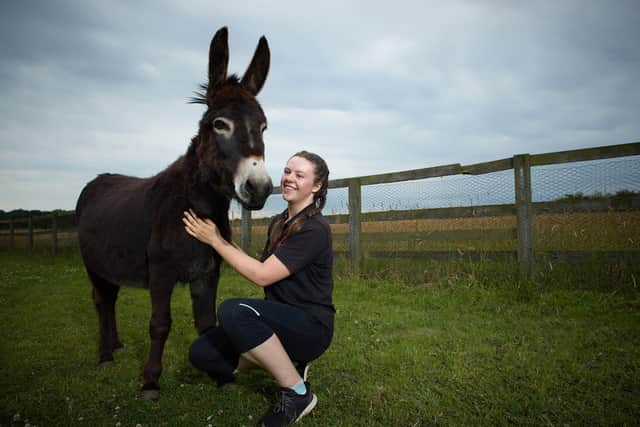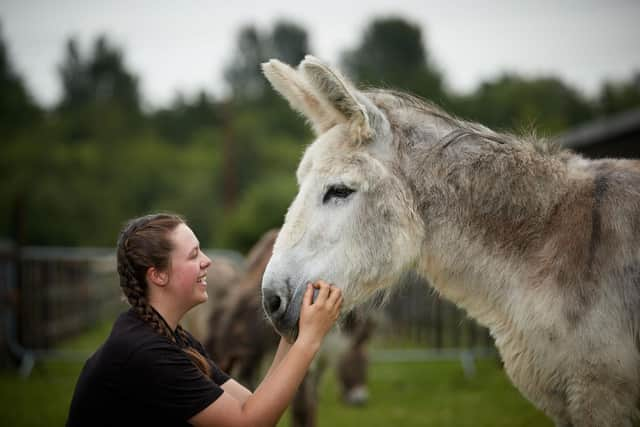Wonkey Donkey: Meet the mother and daughter behind the Yorkshire sanctuary marking seven years of caring for donkeys
The saying originates from the darkest days of the First World War. The ordinary foot soldiers, the infantry lads in the trenches who were the cannon fodder of the British army, were, it was claimed, “the heroes led by donkeys”. They were remorselessly sent to their deaths, or serious injury, by their generals, who were held to be at best remote from the actual conflict.
The expression has its roots in truth, as far as the lads on the front line were concerned. But the animal picked as the exemplar of wilful disregard is a deeply unfair choice. Donkeys, it is true, have a stubbornness in their nature – but they are also loyal, hard-working and steadfast. And it is worth remembering that eight million donkeys, mules and horses died in the conditions of the fields of Flanders, Ypres, Passchendaele, Mons and all the other key on the ground conflicts of that terrible “war to end all wars”.
Advertisement
Hide AdAdvertisement
Hide AdThese animals, many of which served in the cavalry, were also the transporters of key supplies – of munitions, or sleepers to build railways, of the steel that served as tracks, or of any number of items that fed the war machine. So, denigrating the reliable (and frequently long-suffering) donkey is not a particularly good comparison.


And there are few who celebrate the achievements of these animals with such passion as Jackie and Jenny Howarth, the mother and daughter who run the Wonkey Donkey sanctuary near Knottingley. You’ll need a good Satnav to track the site down, but, in peaceful fields, and far from any major community, there it sits, acres of what was once pasture, and now the home to 29 donkeys – not to mention six ponies and five goats.
The donkeys are nearly all “rescue” animals, saved from jobs of drudgery – or worse. Jackie, 68, tells a story of being down in Devon, and persuaded to go to a livestock sale. What she and Jenny witnessed simply appalled them. “The show ring, where the animals were paraded was so small that it was unbelievable,” she recalls with a shudder.
“And we could plainly see the poor things that were up for sale – the minimum price that you can bid at these events is just Ten Guineas, and many of the dealers clearly felt that was far too much to be asking, The whole thing was gruesome, and made even more macabre when we discovered that the organiser took the unsold beasts to her ‘farm’, took care of them for maybe a few weeks, and then had them slaughtered – to be turned into food products. It was just obscene.”
Advertisement
Hide AdAdvertisement
Hide AdNeedless to say, Jenny, 24, and Jackie did not return to Yorkshire without some new friends. So where did this deep and very affecting passion – it is far more than love, or a hobby – for donkeys begin? Well, Jackie was a noted horse-rider and show-woman for many years, but it all started when Jenny suffered an injury to a lower limb just before she was about to start secondary school.


Officially, it was a torn ligament, but it caused so much pain that the youngster was barely able to move. Doctors gave several opinions, and offered solutions, but none worked. In fact, she was in so much agony, that her brain went into what is known as “conversion syndrome”. It simply cannot cope with the pain, and offer support to mobility at the same time.
For some reason that she is still not adequately able to explain, Jenny asked for a donkey as a companion. Jackie confesses that she was rather surprised when the request came out of the blue. But the bond between the two is so strong that the request was granted, and eight-month-old Buttons arrived on the doorstep.
“He was just skin and bones,” recalls Jenny, “and he was terrified of everything. Why buttons? He had a row of black circular patches all down his back. I had to gain his confidence, and I started by just standing outside his stable, by the door, and talking to him. It took weeks, but I slowly moved inside. And finally, he recognised me not as an enemy (he’d obviously been treated very cruelly) but as a friend.”
Advertisement
Hide AdAdvertisement
Hide AdIt was the start of the sanctuary, and the first – literally – independent steps for Jenny. It tells you a lot about her character that, when she did return to school and full-time education, she exited with no less than 11 GCSEs, and as head girl. It also tells you a lot about Jenny’s self-effacing nature that the school always gave gold star badges for achievements to the pupils. Jenny politely refused to wear hers, because she did not want to feel superior or “special” to any of her other classmates.
Jenny says that, unlike a great many teenagers, “I knew where my vocation was, right from when I was 12 or 13 or so. I’ve always believed that if you have something that you really want to do, go and do it – no matter what anybody else tells you. Have a goal in life, and chase it, no matter what.”
Buttons was where it all began and, though, like so many other organisations, the sanctuary is still recovering from the problems created by lockdowns, now it has many thousands of visitors every year.
Jenny and her mother even (tentatively at first) began showing some of their animals at field events. Jenny wasn’t convinced about getting in the ring, but overcame her shyness and gained much confidence. Jackie, meanwhile, was apprehensive for another reason.
Advertisement
Hide AdAdvertisement
Hide Ad“Being a showjumper for so many years, I really wondered what my old friends and colleagues would say when I arrived in the ring, not with a magnificent horse, but leading a well-groomed donkey. Would I be laughed at? I needn’t have worried – all I could hear were shots of ‘Go for it, Jackie girl!’”
There have been other family adversities – Jenny, her cousin and two of her aunts were all caught up in the terror that was the Manchester Arena bombing. The two older ladies suffered appalling injuries, and were only ten or so feet away from the bomber. Neither of them is, as yet, confident of being anywhere near people en masse.
But the Howarth clan are a resilient lot, and nearly all are involved, one way or another, with the sanctuary. There’s the cosy little café, and the gift shop, for a start, and every single penny from those side-lines, as well as the admission fees are ploughed straight back into the sanctuary’s maintenance and survival.
Jenny and Jackie are constantly exploring new ways to find revenue, and to pay the bills. Jenny wondered if she’d even get any response at all to her recent fundraising plea on social media. The result? Bales of hay from one anonymous donor, and many other vital donations. Their motto seems to be “adapt to survive”, and it works for them.
Advertisement
Hide AdAdvertisement
Hide AdThere is an evident bond between mother and daughter – paradoxically made stronger by the fact that they work together, and live in close proximity. “We have never fallen out. Ever,” says Jackie. And then she smiles: “We may have disagreements. But never ever arguments. There’s a big difference.”
Earlier this month, the Wonkey Donkey sanctuary celebrated seven years since opening.
Over the summer, the site is holding a number of events including the opportunity to meet children’s characters Mickey Mouse, Po from the Teletubbies and Bing.
A Wonkey Donkey experience day is also being planned for children on August 30, offering youngsters the opportunity to learn all about the animals from their care, mucking out and feeding to donkey grooming.
Advertisement
Hide AdAdvertisement
Hide AdThe Wonkey Donkey sanctuary is at Little Oakes Farm, Cobcroft Lane, Knottingley. Please check for opening times – special visits for groups and organisations by prior arrangement.
Visit www.wonkey-donkey.co.uk or Wonkey Donkey visitors centre on Facebook.